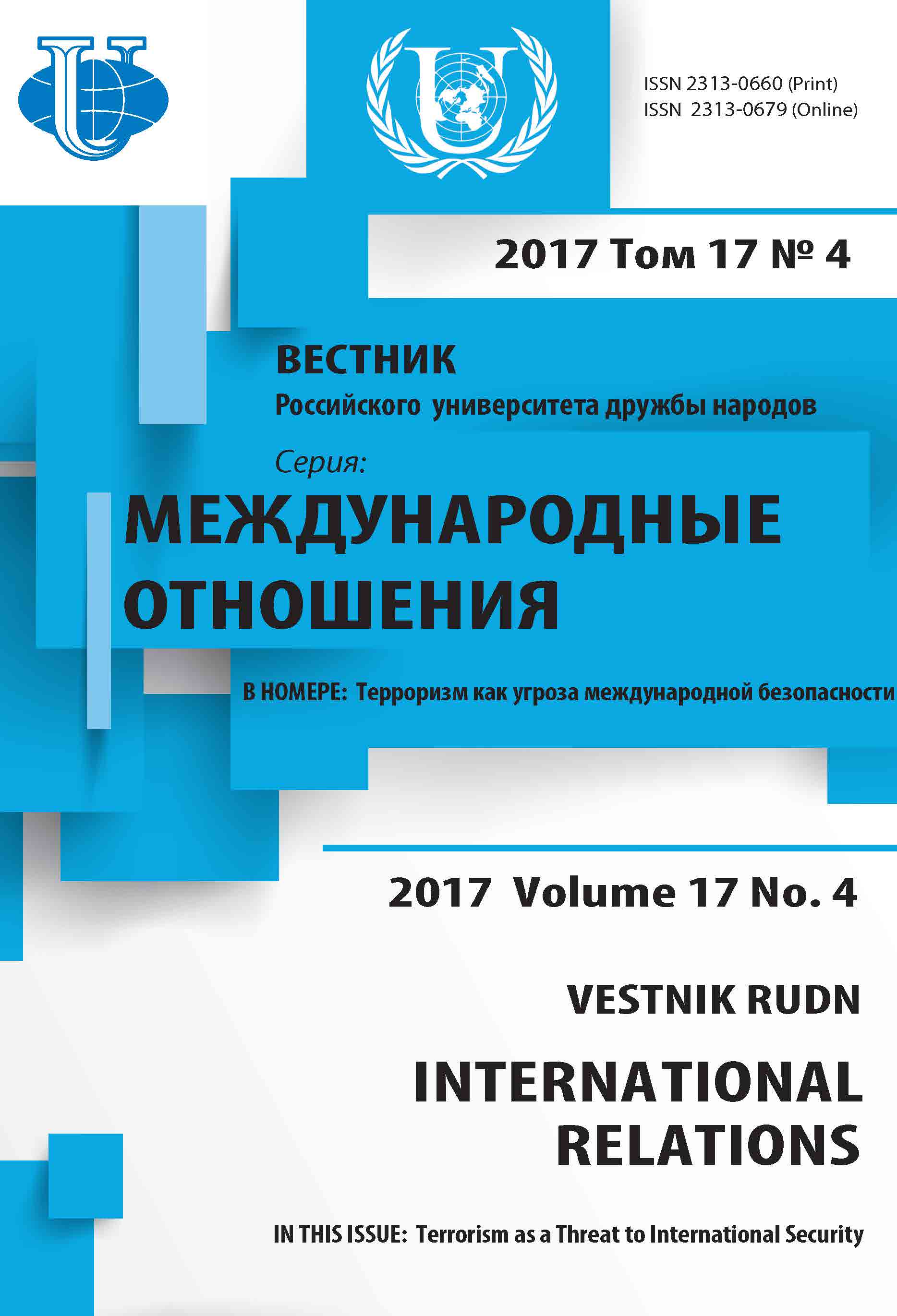RUSSIA RETURNS TO AFGHANISTAN: PROSPECTS OF BILATERAL ECONOMIC COOPERATION
- Authors: Asef N.1
-
Affiliations:
- Peoples Friendship University of Russia (RUDN University)
- Issue: Vol 17, No 4 (2017): Terrorism as a threat to international security
- Pages: 781-792
- Section: BILATERIAL RELATIONS
- URL: https://journals.rudn.ru/international-relations/article/view/17536
- DOI: https://doi.org/10.22363/2313-0660-2017-17-4-781-792
- ID: 17536
Cite item
Full Text
Abstract
He article discusses the dynamics of the development of the economic situation in the Is-lamic Republic of Afghanistan after the fall of the Taliban regime in 2001, and the current state and prospects of development of Russian-Afghan trade and economic relations. Russia and Afghanistan have a long history of cooperation. In the XX century, the Soviet Union provided economic assistance to Afghanistan, including the financing and construction of objects of industry and infrastructure, which are now in need of rehabili-tation and modernization. The accumulated experience of cooperation makes Russia may be one of the major players in Afghani-stan and participate in reconstruction of the country. The relevance of this article stems from the fact that at the present time in conditions of economic sanctions and the deterioration of relations with countries of the West, Russia intends to renew and develop relationships with long-term partners. Today Afghanistan is trying to recover from the devastating effects of years of civil war, and invite Russia to join this process. This means that Russia had a unique chance to return and gain a foothold in the market of Afghanistan, which will be an advantage for the development of cooperation between the two countries. The task of the article is analysis of the economic situation in Afghanistan, in order to study the possibilities of deepening and development of Russian-Afghan trade and economic cooperation. The analysis of Russian-Afghan relations showed that to date, despite the existence of certain problems faced by our country, the development of trade and economic relations is a promising direction of bilateral cooperation.
About the authors
Naderi Asef
Peoples Friendship University of Russia (RUDN University)
Author for correspondence.
Email: asef.naderi@gmail.com
Asef Naderi - post-graduate student of the Department of theory and history of international relations of the Peoples’ Friendship University of Russia (RUDN University)
References
- Amin, M. (2017). The Story Behind China’s Long-Stalled Mine in Afghanistan. The Diplomat. URL: http://thediplomat.com/2017/01/the-story-behind-chinas-long-stalled-mine-in-afghanistan/ (accessed: 11.08.2017).
- Arunova, M.R. (2012). Afghanistan and Pakistan: current state and development prospects. Moscow: IV RAN, 155—168. (In Russ.).
- Bondarenko, I.N. (2011). Afghan Notes: History with the Builder’s Eyes. Stroitel’nyye materialy, oborudovaniye, tekhnologii XXI veka, 3 (146), 50—51. (In Russ.).
- Chikhrinova, A.I. (2015). Russia’s foreign policy interests in Afghanistan: modern priorities [dissertation]. Moscow: RUDN University. (In Russ.).
- Cibea, A., Dearing, S., Gures, G., Khan, A. & Wolfsgruber, I. (2013). Budapest Process: a silk routes partnership for migration. Vienna: International Centre for Migration Policy Development.
- Greenfield, V., Crane, K., Bond, C., Chandler, N., Luoto, J. & Oliker, O. (2015). Reducing the Cultivation of Opium Poppies in Southern Afghanistan. Santa Monica: RAND Corporation.
- Khaneyev, M. (2008). Political instability in Afghanistan: the war of ideas or the struggle of clans? Asia and Africa today, 11, 51—56. (In Russ.).
- Korgun, V.G. (2004). Afghanistan in the beginning of the XXI century. Moscow: Institut izucheniya Izrailya i stran Blizhnego Vostoka. (In Russ.).
- Laletin, Y.P. Russian-Afghan relations at the present stage. URL: https://mgimo.ru/ upload/iblock/b57/b5731488fe76d68718d1247008145d71.pdf (accessed: 11.08.2017). (In Russ.).
- Mendkovich, N.А. (2012). Russia’s policy in Afghanistan in 2001—2011. Fond istoricheskoy perspektivy. URL: http://www.perspektivy.info/rus/desk/politika_rossii_v_afganistane_v_20012011_gg_ 2012-02-17.htm. (In Russ.).
- Menkiszak, M. (2011). Russia’s Afghan problem. The Russian Federation and the Afghanistan problem since 2001. Warsaw: Centre for Eastern Studies.
- Mikhailenko, A.N. & Kozhukhov, A.V. (2014). The dominant factor in Russian-Afghan relations. Etnosotsium i mezhnatsional’naya kul’tura, 10 (76), 134—143. (In Russ.).
- Rytövuori-Apunen, H. (2016). The Regional Security Puzzle around Afghanistan: Bordering Practices in Central Asia and Beyond. Opladen: B. Budrich.
- Safronova, E.I. (2012). Optimizing the economic relations of the “SCO-Afghanistan”. Kitay v mirovoy i regional’noy politike. Moscow: IDV RAN, 280—293. (In Russ.).
- Siddiqui, A. & Butt, K. (2014). Afghanistan-Soviet Relations during the Cold War: A Threat for South Asian Peace. A Research Journal of South Asian Studies, 2 (29), 617—631.
- Toporkov, V.M. (2013). Russia’s national interests in Afghanistan and prospects for its regional policy. Vestnik Permskogo Universiteta, 3(23), 225—232. (In Russ.).
Supplementary files










